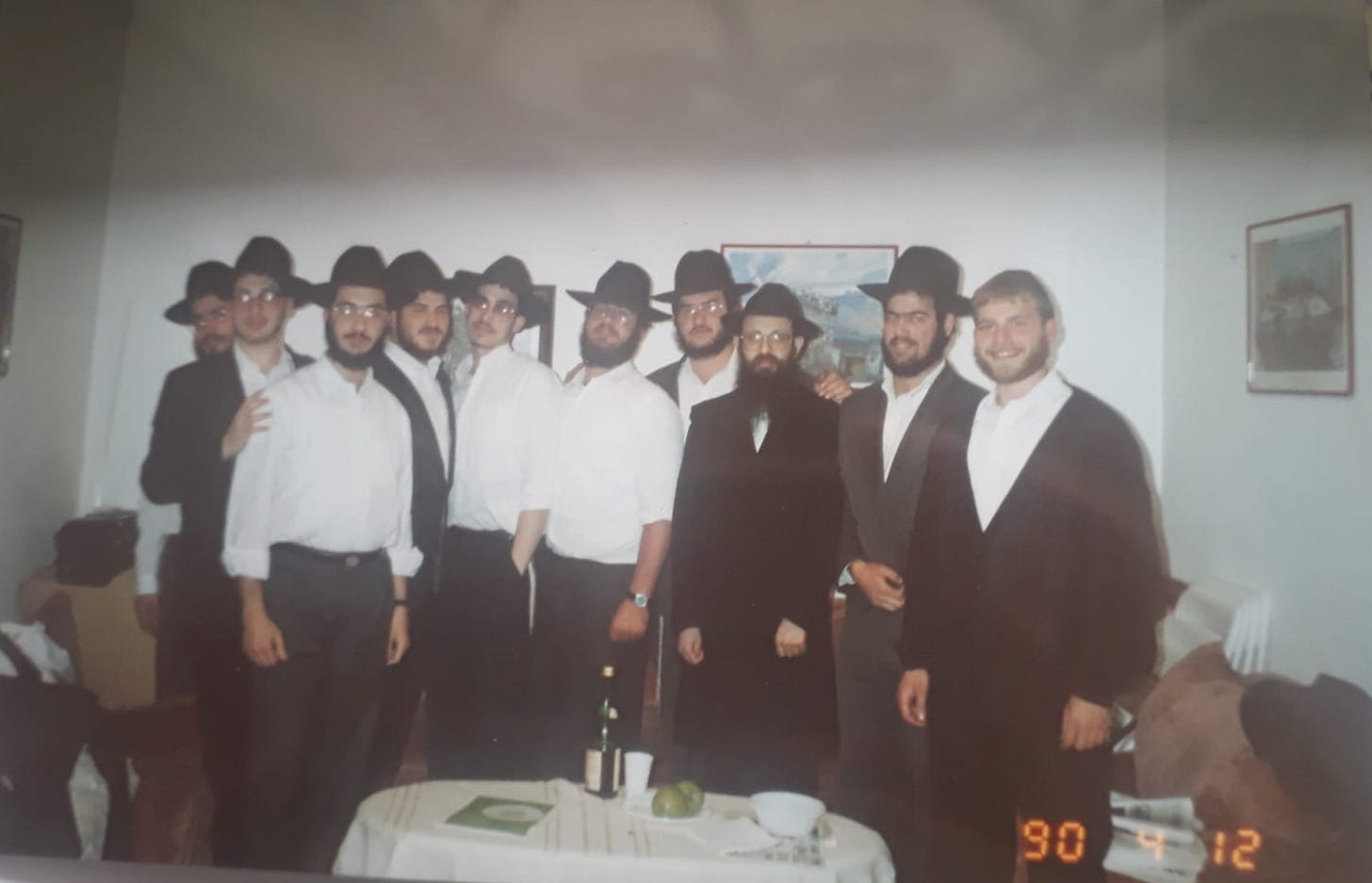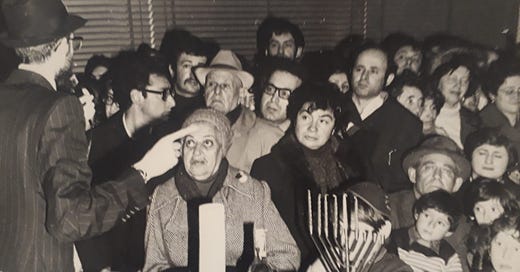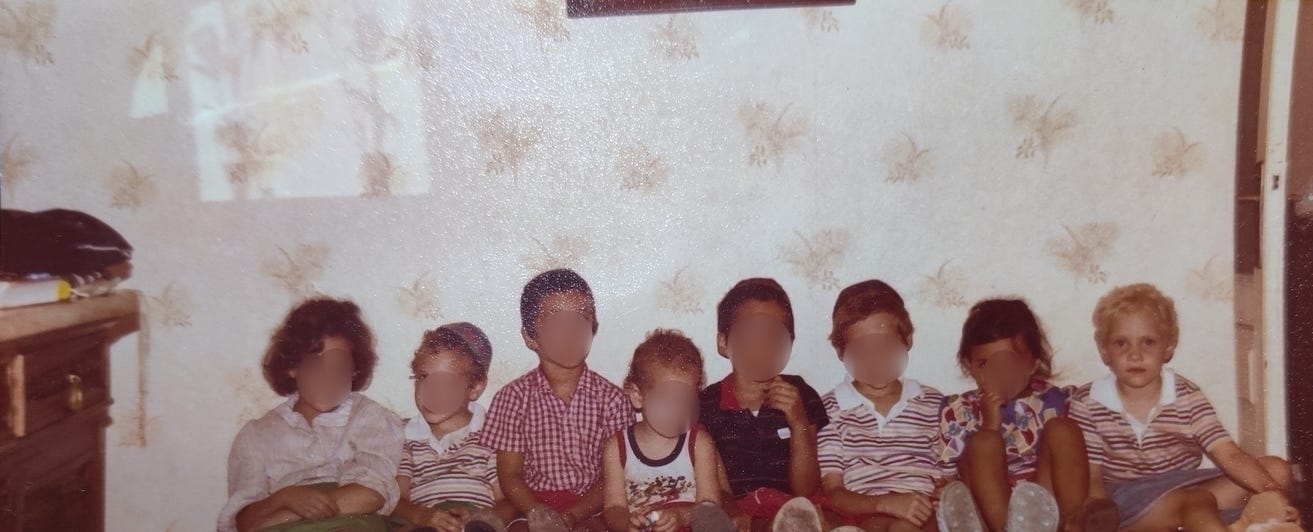Before I left home at age 7 to go to school in Milan, the main interaction my siblings and I had with other religious, and particularly Chabad, kids, was with the families that came to the area to assist the Jewish immigrants from the USSR and Iran.
Through the ’70s and into the early 90s, when the iron curtain fell, Rome and its vicinity hosted many thousands of Jews who were waiting for visas to the US, Canada or Australia. Housing was made available for them in the city proper, but mainly in the seaside towns near Rome: Ladispoli, Ostia, Nettuno, Anzio and more.
My parents were sent to Rome in 1976. Coordinating with the Joint (JDC), HIAS and other agencies, as well as with the Rebbe’s office in NY, they set up programs and services for the refugees, including arranging circumcision for children and adults who were not able to get circumcised in Russia, Jewish weddings, and more. Programs included shiurim and yom tov meals but also social activities, social services and much more.
The central hub was Ladispoli, so my father brought Chabad couples who lived there for a period of time. One family that lived there for years when I was quite young was the B. family.
They were perfect for the situation, because Mrs B. spoke Italian, having grown up in Milan, and Rabbi B. had grown up in Russia, like my father. Additionally, they both spoke fluent yiddish, as did many of the older Russian refugees.
Sometimes, we went to visit the B.s on Sundays. They lived in a small rented house with a backyard. Coming from our small 2-bedroom apartment, this was very exciting. They had chickens! My siblings and I stayed in their home overnight once, when my parents had to go somewhere. Yiddish was the lingua franca in the B. home, while ours was not nearly as good, but we understood each other and had great fun. S., the oldest child, taught me how to suck the marrow out of chicken bones - a valuable lesson and something I still do in the privacy of my own kitchen.
A decade later, I reconnected with S. and her sister DL - who was very mischievous as a little girl - in Israel where we all attended high school.
Rabbi B. rode a basic motorcycle around Ladispoli, which was very practical. When we visited, he gave my brothers rides on it.
In addition to their work with the locals in Rome, my parents continued to coordinate aid for the immigrants. My mother and older siblings remember that my father used to walk to the other side of town to conduct a Seder for Russian immigrants, then walk home, where the guests had been waiting, and start a second Seder at midnight.
In the late 80s and early 90s, my parents brought yeshiva students from NY to assist during Tishrei and Pesach - they were to scatter in pairs in the various seaside towns, leading davening and meals. The presence of these guys was very exciting for us - suddenly we had a batch of older brothers who spoke English, like us, and understood our cultural references. We met some of our cousins this way - first cousins on my father’s side, and second cousins on my mom’s.
Before Pesach, my mother prepared and packed food for the bochurim according to their various personal stringencies. Think about that scenario: in addition to cooking food from scratch for our family and all the guests, she took the time to cook this with shmaltz for that guy, and this without who knows what ingredient for the other guy. One year there were as many as 20 bochurim. Loaded with their personalized homemade food, including my sister’s charoses and my father’s freshly grated chrein, they set out for Anzio, Ostia and so forth to run sedarim for thousands. According to my father, in 1989 there were a total of 9000 people at all the sedarim combined.

In the summers, the N. family, a half-Persian Lubavitch family, came down from Milan to assist the Iranian refugees. They rented an apartment in Ladispoli and we became fast friends with their children. One summer my parents rented an apartment there as well, so when we were not away at camp we spent a lot of time together, eating cooling watermelon on the N.’s terrace or visiting the beach.
Pictured below, some of us with the N. kids on the high-riser in our dining room in the ‘old house’, which also doubled as a couch. My brothers and I are wearing the matching striped shirts that Mrs. N. purchased for all the kids at the market in Ladispoli.
Our relationship with the N. family did not end there - in fact, it continued for decades. When I left for Milan at age 7, I lived in their home that first year. Their daughter was in my class and we shared a room (and her fancy real Barbies with all the props). Many of my siblings also lived with them throughout our years in Milan. When they moved to NY years later, my younger sisters boarded with them when they were in high school.
Mrs N. used to make whole wheat bread in a bread machine overnight and serve each child a thick, still-warm slice for breakfast, slathered in French butter. It was delicious. In those days, they were the only people I knew who ate whole grains.
The N.s had a live-in housekeeper from Thailand named Muc. She was great and everyone in the community knew her and loved her.
In their home, I was introduced to some Persian foods on shabbos, and on Sundays, the extended N. family drove to the other side of town to visit their grandparents, whom everyone in the community referred to as Bibi and Bobo, whether they were our grandparents or not. Bibi served a variety of Persian rice - I picked out the raisins - and treated me like a member of the family. They had a bowl of pieces of caramelized hard sugar candy that Mr. N. forbade us to touch - but we snuck some into our pockets every time.
Mr. N. tragically passed away in recent weeks, after a terrible illness. At the shiva, we remembered how he used to dance with us in a circle during haneros halalu, spinning faster and faster until he flung us on the couch. On shabbos in Milan, he davened so late and so carefully that we often did not get home for the meal until 4 or 5 in the afternoon. We got to know that shul on Via Cellini very well, with all its nooks and crannies for playing hide and seek.
Mr N. was an incredibly warm and kind person with an interesting quirk - he had a gold pendulum that he would swing over certain foods to determine whether they were good or not, according to certain criteria unknown to me.
Two of Mr. N’s brothers lived in Milan and the families were close-knit. One of them passed away after a terrible car accident, leaving a beautiful family behind, and a huge scar on the community in Milan, who all came together to help his wife and children. As a child, I couldn’t help but remember he had promised me a new doll.
Allow me to pivot back to the Russian immigrants. Throughout my life, I’ve continued to meet people who passed through Rome or its vicinity on their way to the US. My first such encounter was when I worked as a counselor at the Chabad day camp in Milwaukee in the late 1990s. Some of my campers in the younger bunk had parents who told me they’d been in Ladispoli or other towns.
The same goes for the shoe-repair couple on Kingston Avenue in Crown Heights, and many many others.
Most recently, I met one of the ‘passed through Italy’ people when I sought treatment for a pinched nerve. In conversation with the doctor, a small woman with a strong accent and clearly Jewish name, it came up that I was from Rome and she told me a story:
Dr. D. told me that upon arriving in Italy, she had been allocated an apartment in one of the seaside towns near Rome.
A man she knew, another FSU Jew, was run over by a car in that same town and killed, leaving behind a wife and young children. He had been planning to look for his father once he reached the United States. His parents divorced when he was very young, and his father emigrated to the US and disappeared from his life. They tried to find him for 15-20 years but could not figure out where he lived in the US.
Dr. D. told me, “The Italian authorities wanted to have our friend cremated, and quickly. We didn’t know much about Judaism, but we knew cremation was against the religion. In a race against time, the Jewish immigration agency (I don’t remember which) was able to find his father within two days - he was living somewhere in California”.
The doctor went on to say that her friends wanted someone to say a prayer for their deceased friend but didn’t know any rabbis. They asked their non-Jewish Italian neighbors who made some inquiries, then drove Dr. D. and some of her friends to the Communita’ Ebraica, the Jewish community in Rome whose headquarters are in the Great Synagogue, where they received assistance.
If I recall correctly, she said the immigration agency raised funds to have their friend’s body flown to the US to receive a Jewish burial.
One of many unknown stories from years gone by.
If you enjoy my writing, please spread the word!





Rabbi B. rode Motorino, which is more like Moped or even Scooter, not a full motorcycle.
Rest in Peace, N. we will miss you. Yes, that Thai lady. Full life nevertheless.